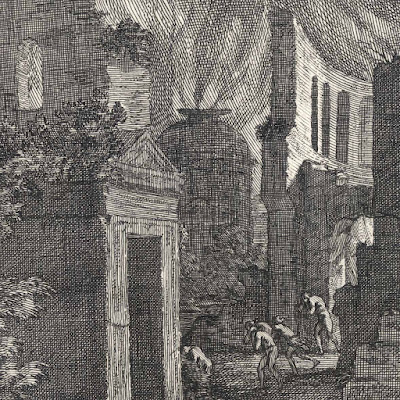Johann Jacob von Sandrart (aka Johann
Jakob von Sandrart) (1655–1698)
“The Fire in the Borgo”, 1682, published
by Joachim von Sandrart (1606–1688) as Plate 0 (as numbered at
upper right) to “Academia Nobilissimae Artis Pictoriae”, printed by Christian Frober
(aka Christian Froberger) (fl.c.1675–1700) in 1683, in Nuremberg, after a detail of Raphael’s
(aka Raffaello Sanzio da Urbino) (1483–1520) design for the fresco of the same
name executed in 1514 that is argued to be painted by Raphael’s assistant, Giulio
Romano (aka Giulio Pippi) (c1499–1546) in the Stanza dell'Incendio di
Borgo, Palazzi Pontifici, Vatican.
(Note: I may be wrong, but based on a
copy of the publication in which this etching features that was auctioned by
Christie’s (30 April 2008, London), I believe that there are 47 plates with 3
double-page illustrations—this print being one of these larger plates as there
is a centrefold that is now flattened.)
Etching on heavy laid paper with full
margins as published. The print consists of two plates abutted: a plate with
the image and a plate with the lettered text below it.
Size: (sheet) 50.3 x 39 cm; (abutted
plates) 46.8 x 32.7 cm; (image borderline) 41.1 x 31.6 cm
Numbered on plate above the image
borderline: (right corner) “0”.
Inscribed on plate below the image
borderline: (left) “Raphael d'Urbino pinxit.”; (right) “Joh. Jac: de Sandrart
delineavit et sculpsit Norimb. 1682”
Lettered on plate in five lines of Latin
text on a separate abutted plate: “Sereniffimo … / … / … / … / … / …
confecratq”; (left of centre) “Sereniffimæ Celfitudinis Veftra”; (right)
“cultor demiffiffimus / Ioh. Iacobus a Sandrart.” (My apologies if there are
errors in my reading of the letters).
Hollstein 350.II
The British Museum offers the following
description of this print:
“The fire in the Borgo; after Raphael;
with various figures fleeing through an archway and over a wall to right in
foreground; in left background the burning city …”
Condition: an almost faultless—well-inked
and well-printed—impression that is in near pristine condition (i.e. there are
no tears, holes, creases—beyond the now flattened centrefold of publication—abrasions,
stains or foxing) for the considerable age of the print. The sheet is backed
with a support sheet of archival (millennium quality) washi paper.
I am selling this large etching of
exceptional quality and very rare—note that the Rijksmuseum does not hold a
copy—for the total cost of AU$246 (currently US$181.50/EUR156.41/GBP137.96 at
the time of posting this print) including postage and handling to anywhere in
the world (but not, of course, any import duties/taxes imposed by some
countries).
If you are interested in purchasing this
marvellously intriguing image executed by one of the major oldmaster German
printmakers of the 17th century, please contact me
(oz_jim@printsandprinciples.com) and I will send you a PayPal invoice to make
the payment easy.
This print has been sold
This scene of tumultuous chaos shows
fleeing naked Romans with Michelangelesque physiques escaping the AD 847 fire
in the Borgo—an area near the Basilica of St Peter in Rome. For sensitive folk that
shudder on seeing other folk in distress, you may relax as I can confirm that
Pope Leo IV interceded with his faith to extinguish the blaze … but his prayers
were sadly ineffective in stopping the old Basillica of St Peter—which may be
seen through the gap in the broken wall—from being reduced to rubble (see the
Web Gallery of Art for a thorough explanation about the fire and Raphael’s
painting: https://www.wga.hu/html_m/r/raphael/4stanze/3borgo/1borgo.html)








No comments:
Post a Comment
Please let me know your thoughts, advice about inaccuracies (including typos) and additional information that you would like to add to any post.